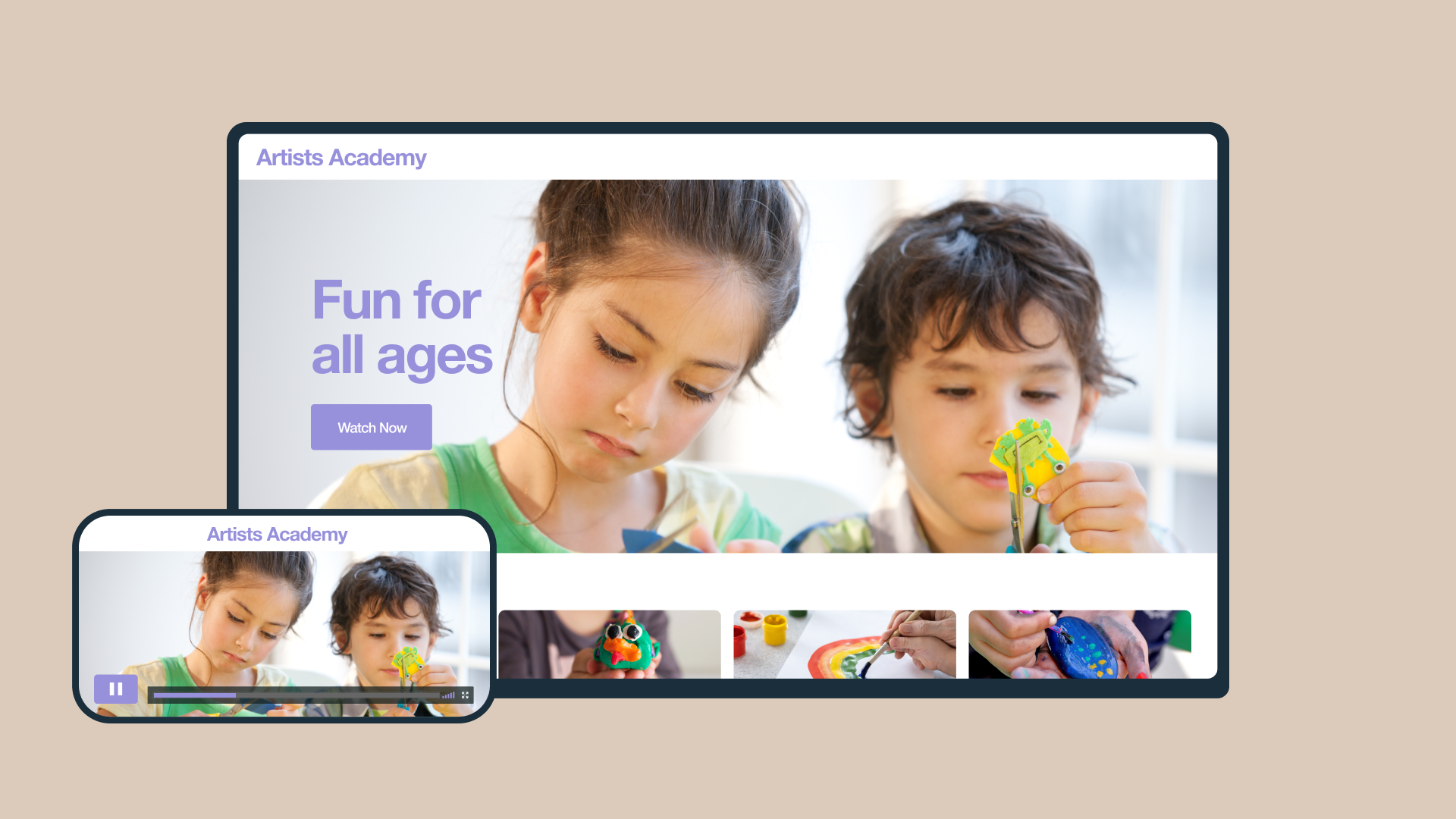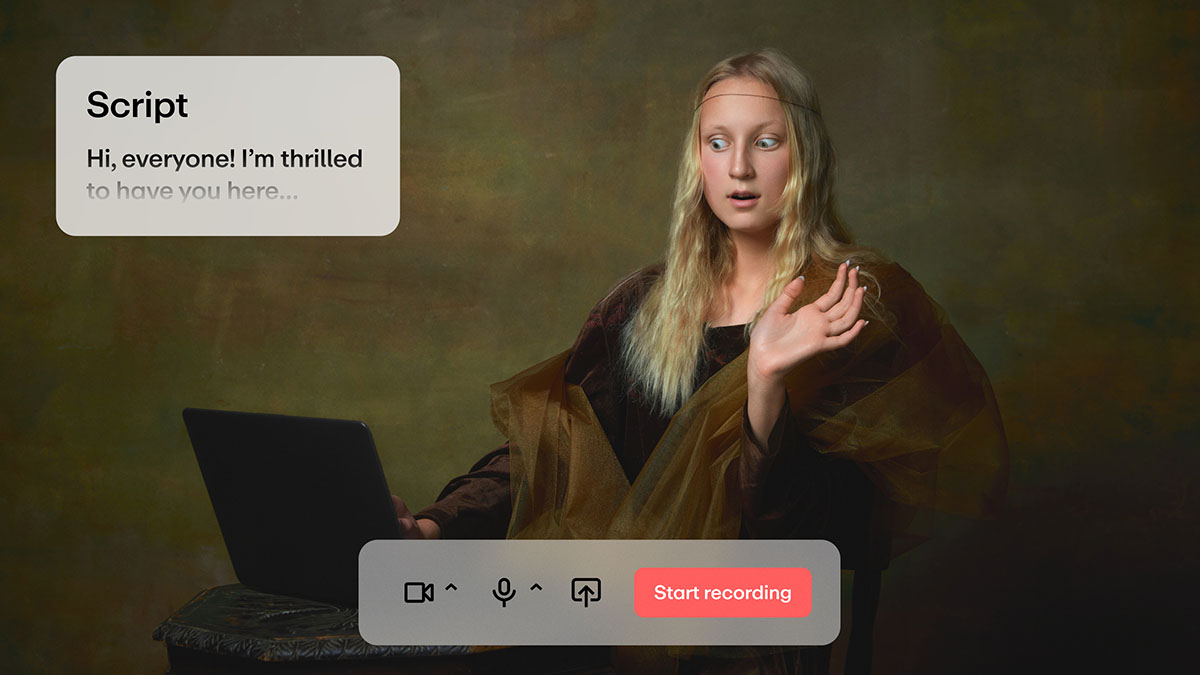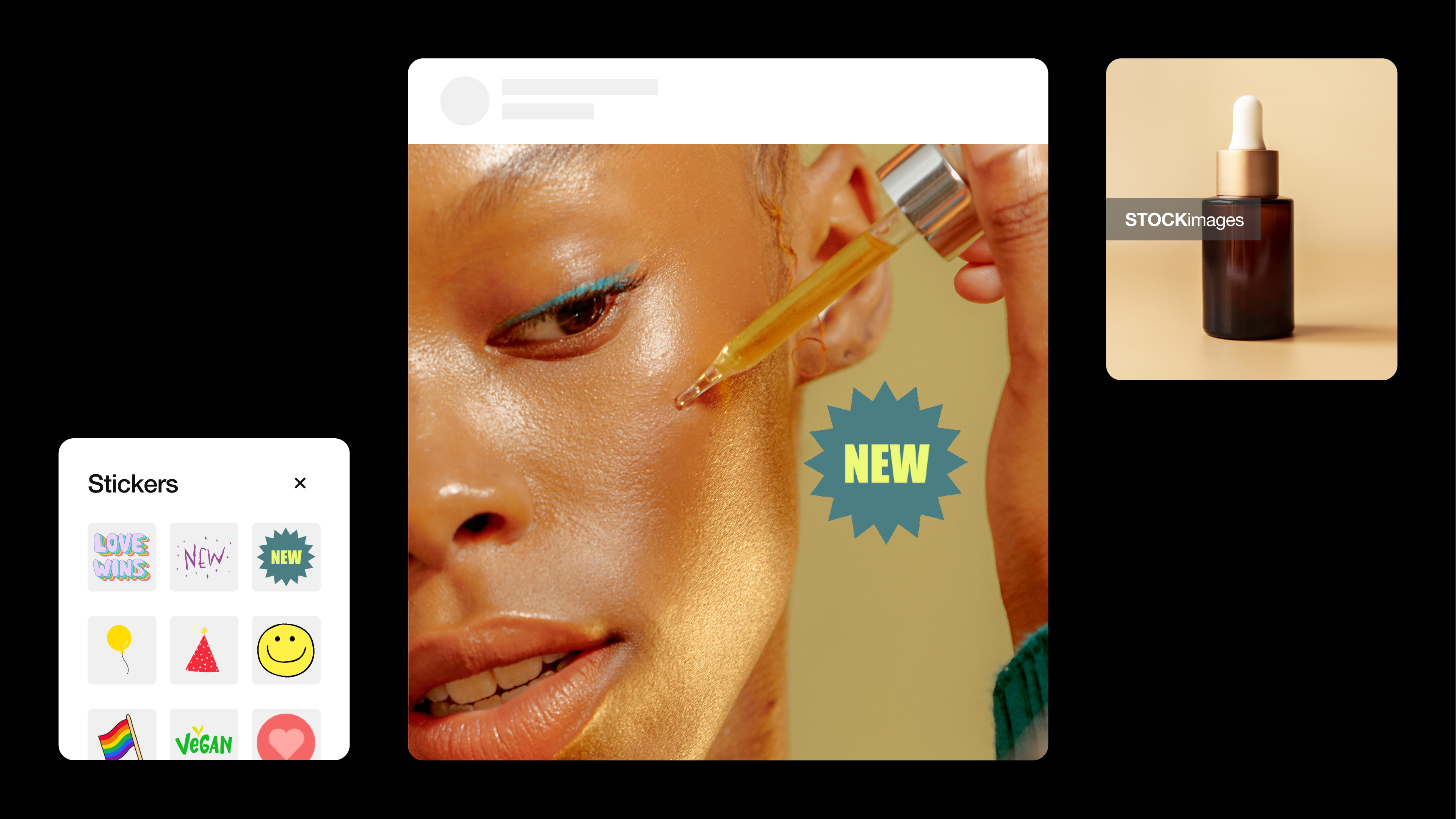Adding quality videos to your online learning platform of choice is an excellent way to offer accessible learning experiences. Videos provide students with a visual demonstration that clarifies the message, making online courses more accessible. With the right platform, e-learning becomes an engaging, interactive experience for both learners and educators.
To effectively incorporate educational videos into your online courses, you’ll need a video learning platform like Vimeo, Coursera, or Skillshare. In this guide, we’ll showcase some top platforms and highlight the features that make them worthwhile.
What’s a video learning platform?
Video learning platforms are part of learning management systems (LMS), which provide learners with educational content like courses, interactive modules, and lectures. This content often features several educational videos embedded within to make the material more accessible and easier to understand.
You’ll use an LMS to set up a platform and all its educational pages, but you’ll want to host videos on a fast, reliable video hosting service like Vimeo. That way, you can seamlessly embed your videos into learning experiences and take advantage of additional features like analytics and interactive content.
What makes a good video training platform?
Great video learning platforms host videos reliably and serve them quickly.
Here are a few features to look out for when selecting a service:
- Intuitive UI: An easily understandable interface that makes navigation and interaction predictable, responsive, and hassle-free.
- Analytics: Data that shows educators which courses are getting the most engagement, so they can record insights about the e-learning strategies that work best based on completion rates and more.
- Interactive elements: Cards, clickable hotspots, and forms that engage learners as they watch an online course.
- Monetization features: Customizable options for setting up subscriptions that help you turn your educational videos into a thriving business.
- Branding options: A video player you can edit to reflect your branding.
11 top video learning platforms to host your online courses
Whether you’re looking for security and flexibility or subscription-based services that allow you to embed your videos, here are 11 of the best video hosting platforms for online courses.
1. Vimeo Streaming
Vimeo Streaming enables education professionals and businesses to host and deliver high-quality educational videos. You can easily embed Vimeo videos on your existing learning management system. You can host and distribute your videos with a Vimeo Enterprise plan, then embed them on your chosen learning management system (LMS). Vimeo also provides a customizable video player, tools to track learner engagement, and interactive features to enhance educational content with quizzes, video branching, and other options.
Vimeo provides the tools that could help turn your educational video content into a sustainable business. You decide how students access their learning materials. Launch your own branded streaming service, complete with a white label website and streaming app, and monetize access to your educational content. No coding skills required!
Alternatively, you can integrate Vimeo's video tools into your existing tech stack, hosting videos with Vimeo and distributing them on your custom-built platform using Vimeo's API or embeddable video player.
Highlights: Browser-based editor, AI video translation, flexible publishing options, several monetization options such as subscription (SVOD), video purchase and rental (TVOD), and more
Best for: Education professionals, businesses, content creators, streamers
Start your e-learning channel →
2. Coursera
Coursera is a video learning platform that integrates with an LMS, such as LinkedIn Learning, to provide a vast library of pre-made courses and videos. It’s best if you have the lesson plans, quizzes, and lectures prepared, but you want to avoid making videos yourself. With Coursera, you can level up your existing learning platform with educational videos from industry veterans.
Highlights: A library of premade videos and several options for embedding them
Best for: Companies with an existing training platform
3. Skillshare
Skillshare lets you create online video courses and organize them into a cohesive lesson plan. It’s a self-contained online learning platform where students can learn about everything from UX design to DIY projects.
Skillshare offers analytics, interactive elements, and several customizable features, but you can’t control the monetization strategy. They pay teachers according to the engagement they get from students, so you won't have full control over income from your videos.
Highlights: An intuitive learning platform with an easy lesson plan editor
Best for: Educational content creators
4. Udemy
Udemy is a specialized video platform for educators. As an instructor on Udemy, you can create comprehensive online courses with exercises, articles, and quizzes.
Similar to Skillshare, Udemy instructors don’t have complete control over monetizing their online courses. While they do control the pricing of each course, they’ll only receive a percentage of the revenue depending on whether the student signed up through a referral promotion or directly through Udemy.
Highlights: A comprehensive lesson plan creator with intricate course creation tools
Best for: Businesses with an existing training plan or educational content creators who want to create and sell courses
5. Treehouse
Treehouse helps you create online learning experiences with quizzes and videos and drive student engagement with leaderboards and achievements. Their platform is focused on providing curated courses developed by their own instructors.
Treehouse for businesses allows organizations to create custom training modules for their teams, which can include uploading their own internal training content and monitoring employee progress. This is for internal organizational use, and not for public course creation. The Treehouse platform does not allow individual users to create their own courses or directly upload/embed their own educational videos for others to take as official Treehouse content.
Highlights: Treehouse offers "Tracks" which are curated learning paths designed to take you from a beginner to a proficient level in a specific skill
Best for: Businesses that want to utilize existing training plans on the Treehouse platform
6. MasterClass
MasterClass leverages the star power of thought leaders like Neil Degrasse-Tyson and Karla Welch to create engaging learning experiences. With MasterClass, your next employee training video could feature Samuel L. Jackson on collaboration or Serena Williams discussing mental toughness.
It won’t help you create an online training platform or knowledge base — as it isn’t an LMS — but a subscription gets you access to a vast library of pre-made content for you to explore. You can’t build your own MasterClass course to monetize, nor do they offer video hosting. It’s strictly for accessing and embedding their library of educational videos.
Highlights: A vast library of premade videos featuring celebrities and industry veterans
Best for: Independent learners or businesses with an existing training plan who want to learn from prominent voices
7. Panopto
Panopto utilizes an innovative feature in its video learning platform: AI-generated videos. It has all the other e-learning features you’d expect from an online learning platform, like quizzes, educational videos, and engagement analytics, but AI-generated video content may not be as accurate or engaging as what humans create, so it’s recommended to only use this feature when appropriate.
Additionally, Panopto’s basic AI course creation tools can result in online courses that come across as generic.
Highlights: AI-powered course creation tools
Best for: Large-scale businesses looking to create a more generalized training program from scratch
8. edX
edX is a Massive Open Online Course (MOOC) platform that offers online courses for a wide range of industries, including data science and cybersecurity.
To create your own training platform using edX, you can employ Open edX, an open-sourced LMS that industry leaders like Microsoft and IBM use. It’s a free video training platform, though you must navigate a complex setup process involving several code pull requests from GitHub.
Highlights: An open-source platform for creating courses for free or a premium library of premade videos
Best for: Tech-savvy educational content creators or businesses of any size that want to encourage employees to advance their education
9. LinkedIn Learning
If you’re a LinkedIn Learning admin, you create a dynamic, engaging online learning platform with personalized pathways for learners and easy course creation tools for instructors. Your online courses can include videos, quizzes, and text as needed to curate an engaging learning experience. Like Coursera or MasterClass, it offers a library of pre-made content, but it also lets you upload your own.
LinkedIn Learning syncs best when your learners have full access to an existing LinkedIn account, maintain their LinkedIn presence, and use their job search platform regularly.
Highlights: Dynamic lesson plans that are personalizable for each student
Best for: Independent learners with a LinkedIn account or businesses of any size with an existing training plan
10. Kaltura
Kaltura offers an always-on video learning platform where students can gather at any time in virtual classrooms to attend hybrid events or watch videos. It integrates with your chosen Learning Management System (LMS), allowing you to manage the curriculum in your preferred tool and utilize all the immersive features Kaltura offers, such as polls, quizzes, and interactive lessons. In this way, it helps to consolidate all the learning systems you use and enhances them with engaging features that’ll encourage more participation from your students.
Highlights: Immersive, interactive features and an always-on virtual space for students
Best for: Educators with an existing curriculum who want to experiment with new ways to engage their students
11. Mux
Mux is an API-first video platform you can use to launch a video streaming platform or embed the player into your preexisting website. It requires that you know a coding language to configure it, but it’s compatible with many common, accessible ones, like Python and PHP.
Highlights: A reliable video player or platform that’s customizable and affordable, as long as you know how to develop it.
Best for: Developers who want a video player and platform builder and know how to do the rest themselves
Video learning platform frequently asked questions
What’s interactive video learning?
An interactive online learning platform incorporates elements that learners engage with while watching an educational video. Pop-up cards, quizzes, and surveys are all examples of interactive elements instructors can use to encourage engagement with their online videos.
Can I use AI to create a training video?
Yes and no. You should only use AI to generate videos that offer general guidance or basic instructions, like collaboration best practices or onboarding instructions. AI only “knows” what it’s learned from thousands of articles and videos, and doesn’t see anything outside of its dataset.
AI won’t help you create a video about something unique, like your company’s culture or business model. You shouldn’t use it to create online courses about nuanced topics like HR or codes of conduct. In both cases, you’ll need a human touch to ensure the video is accurate.
Does Vimeo support interactive videos?
Yes! Vimeo Enterprise offers several interactive features that enhance online learning experiences. There’s a tab in the video editor for adding clickable hotspots, informational overlays, quizzing, and sign-up forms that help you generate leads from your online videos.
Experiment with Vimeo’s interactive features →
How effective is video-based learning?
Online education is a very different type of classroom from in-person learning, and educational videos help to bridge that gap. They offer visual demonstrations and engaging video content that allow instructors to reach out to learners in a more personable and approachable way. The best online learning platforms use interactive elements and high-quality videos to make e-learning as educational and engaging as an educator in a classroom.
What is the best video learning platform?
The best video learning platform depends heavily on whether you're a course creator, an institution, or a learner, and what specific features you prioritize.
Platforms such as Coursera and edX are great for anyone looking for university-level courses, accredited certificates, and detailed academic content from well-known institutions. On the other hand, Udemy and Skillshare provide a huge variety of options at affordable prices, covering a wide array of skills, usually emphasizing practical application and hands-on learning.
When it comes to hosting educational videos in a learning environment, it's best to use platforms that have solid video management and features designed for teaching online. Vimeo is great for high-quality, ad-free hosting with excellent privacy settings and LMS integrations for learning and development needs.
Platforms like Panopto and Kaltura focus on academic and corporate education, offering tools for capturing lectures, interactive videos, and detailed analytics aimed at improving educational results. Meanwhle, platforms like Kajabi, Teachable, and Thinkific also offer tools for course building, marketing, and sales that are worth checking out.
Discover what’s best for your e-learning needs
The right video platform for you depends on your business goals, budget, and audience. Some excel at creating customizable training platforms, while others specialize in offering a library of online courses.
Vimeo Streaming offers educational professionals and businesses a comprehensive solution for their learning and development needs with an all-in-one platform for video hosting, storage, editing, and publishing to support their online learning and education strategy.




